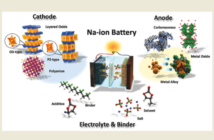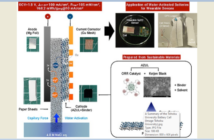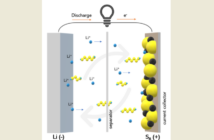The Helmholtz Institut (HIU) established by Karlsruhe Institute of Technology (KIT) is pushing research relating to batteries of the next and next-but-one generations: A research team has now developed an electrolyte that may be used for the construction of magnesium-sulfur battery cells. With magnesium, higher storage densities could be achieved than with lithium. Moreover, magnesium is abundant in nature, it is non-toxic, and does not degrade in air. The new electrolyte is now presented in the journal “Advanced Energy Materials”.
In many electrical devices, lithium-ion and metal-hydride batteries are applied for energy storage. Scientists are also studying alternatives to these established battery systems in order to enhance the safety, cost efficiency, sustainability, and performance of future devices. It is their objective to replace lithium by other elements. For this purpose, all battery components have to be newly developed and understanding of electrochemical processes is required.
Magnesium-based battery cells are presently considered an attractive option to replace lithium in batteries. In principle, magnesium allows higher storage densities to be reached than lithium. Other advantages of magnesium are its high abundance in nature, its non-toxicity, and its low degradation in air in contrast to lithium. So far, progress achieved in this area has been limited. For the design of magnesium batteries of high storage capacity and power density, suitable electrolytes are needed that can be easily to produced, that are stable, and can be used in high concentrations in different solvents.
At the HIU, a research team headed by Maximilian Fichtner and Zhirong Zhao-Karger has now presented a new promising electrolyte, which might allow for the development of an entirely new generation of batteries. The new electrolyte is characterized by a number of promising properties. It possesses an unprecedented electrochemical stability window and a very high efficiency. In addition, the electrolyte can be used in various solvents and at high concentrations. Moreover, the electrolyte is chemically compatible with a sulfur cathode, which can be discharged at a voltage close to the theoretical value.i
Another advantage is the very simple production of the electrolyte. “Two commercially available standard chemicals, a magnesium amide and aluminium chloride, are applied. They are added to the solvent desired and subjected to stirring. This simple mixture can then be used directly as an electrolyte in the battery.”, Maximilian Fichtner says.
Zhirong Zhao-Karger, Xiangyu Zhao, Di Wang, Thomas Diemant, R. Jürgen Behm, and Maximilian Fichtner: Performance Improvement of Magnesium Sulfur Batteries with Modified Non-Nucleophilic Elec-trolytes. Advanced Energy Materials. Article first published online: 6 OCT 2014. DOI: 10.1002/aenm.20140115.
About the Helmholtz Institute Ulm (HIU)
The HIU was established in January 2011 by KIT, member of the Helmholtz Association, in cooperation with Ulm University. With the German Aerospace Center (DLR) and the Center for Solar Energy and Hydrogen Research Baden-Württemberg (ZSW), two other renowned institutions are involved in the HIU as associated partners. The international team of about 110 scientists at HIU works on the further development of the fundamentals of viable energy storage systems for stationary and mobile use.
Karlsruhe Institute of Technology (KIT) is a public corporation according to the legislation of the state of Baden-Württemberg. It fulfills the mission of a university and the mission of a national research center of the Helmholtz Association. Research activities focus on energy, the natural and built environment as well as on society and technology and cover the whole range extending from fundamental aspects to application. With about 9400 employees, including more than 6000 staff members in the science and education sector, and 24500 students, KIT is one of the biggest research and education institutions in Europe. Work of KIT is based on the knowledge triangle of research, teaching, and innovation.
-20-
UPS Battery Center is a leading manufacturer and supplier of UPS systems, UPS batteries, and other industrial battery applications. We build reliable, high quality, new and refurbished products, and we recycle any qualified components as part of our green initiatives. UPS Battery Center is also a resource for relevant and current information about batteries, UPS systems, and the electrical industry.
View the Original Press Release
Related Articles:
Magnesium-Ion Batteries: One Step Up From The Li-Ion Technology
Environmentally Friendly Alternatives Exist for Li-ion Batteries
Analysis Of Manganese-Based Crystals Makes It A Possible Battery Candidate




